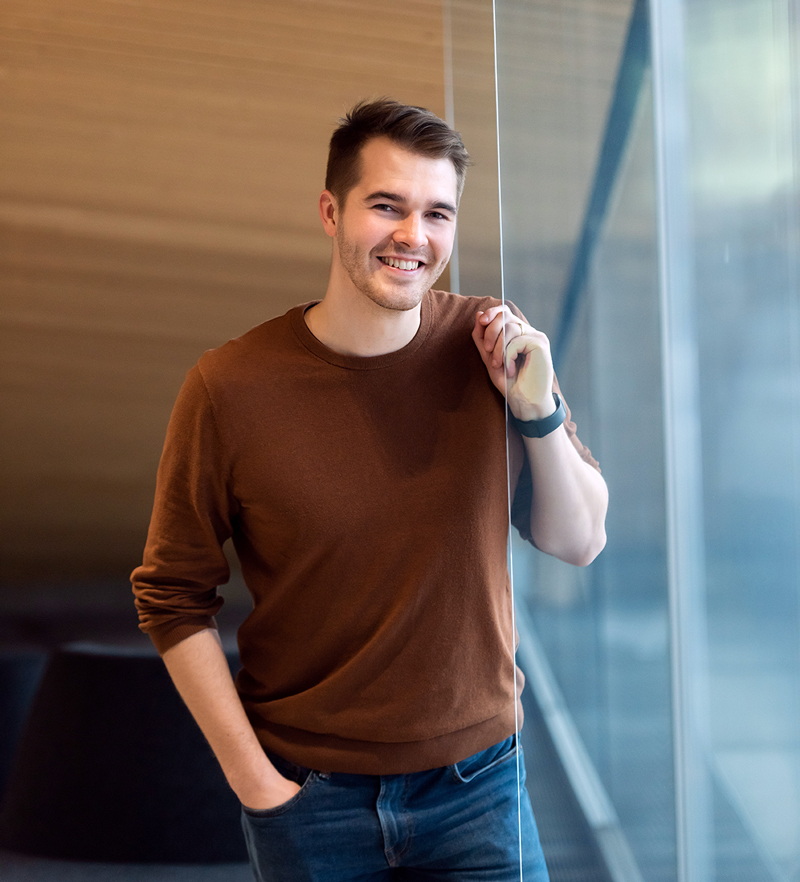Futurist Perttu Pölönen is also an optimist: “Big changes have always started with a single individual”
Technology is the best way to change people’s behaviour. This is the opinion of futurist Perttu Pölönen. A cultural change is also required, however, and even one person can set changes in motion by bravely setting an example.

What kind of a world do we want, asks Perttu Pölönen. His thinking is in high demand, as he is currently touring Finland to talk about the challenges and opportunities of the future and about change in general.
Pölönen has a lot to draw from. He has been studying future technologies at NASA’s campus as a result of winning the EU’s largest youth science competition. When speaking, Pölönen emphasises the significance of technology while bearing the human aspect in mind as well. More discussion is needed regarding the pros and cons of technology in particular, as humans have not been able to keep up with the rapid pace of development.
– Technology has a grip on us. We are now experts at getting people hooked on a service, but humans should be controlling technology and not vice versa.
Pölönen feels that technology needs to be made more human, and one of his solutions is to make it more cross-disciplinary.
– It’s not technology’s fault if it is difficult to understand. The problem is that technology is being developed by a small, homogeneous group of people who might not have considered that there are different people and viewpoints. And why does technology look like it does now? We need to remember that whoever creates something builds it to their individual needs.
We can solve climate change
– Technology shapes our routines, so it could help us live smarter and more sustainably, Pölönen contemplates.
We can use it to solve future challenges, but technology alone will not suffice. We also need a cultural change.
Some degree of change is already visible, Pölönen says, as Finns have started to think more about their overconsumption during the pandemic.
– Salary and well-being only correlate up to a point, so it could be asked whether financial growth has now given us all that it can give. We might no longer choose the cheapest option but instead consider what is genuinely wise and important.
Pölönen is a firm believer in the power of optimism. We should base all our thinking on the fact that we have opportunities. Even climate change can be solved, even though it is easy to fall into a state of learned despair and think that no one person can save the world.
– An individual can set an example, however. A brave act will cause a domino effect: When one person dares to do something brave, another person sees that it is possible. They become inspired and want to participate. Soon, you have an entire movement.
– When you look at big changes, they have always started from a single person, a single tweet or a single moment. In the end, they expanded and covered the entire world like an avalanche, Pölönen continues.
Diversity will bring about change
Everyone needs motivation to act. Pölönen emphasises that we need diversity to bring about change, as people will always consider the solutions from their own point of view.
– Having diversity is very important. We need different people of different ages and different backgrounds to tell us what is wrong. If we all approach a problem from a common perspective, we will not really solve it, as we have not truly understood it.
Pölönen feels that talking about the future is important, even if it is hard to predict.
– The way that predicting the future works is that people change their behaviour according to your prediction. We need to talk about the future, the world and development, but we need to understand that whatever we say is not set in stone. Experts will continue to be wrong and scenarios will continue to be incorrect.
WHO?
Perttu Pölönen
26-year-old futurist, speaker, composer, entrepreneur and writer.
- Graduated from Sibelius Academy as a composer. Also studied future technologies at NASA’s campus.
- As a teenager, he developed the MusiClock application that took him to Silicon Valley to study future technologies. He is now involved in a company in the educational sector and also works a lot as a speaker.
Text: Kati Marjamaa
Photos Markku Lempinen